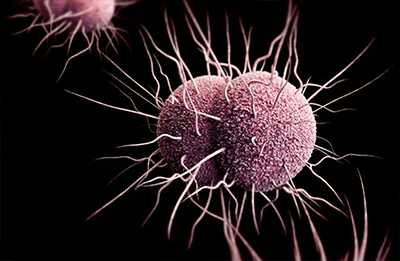AMD Projects: Treating the Antimicrobial-Resistant Gonorrhea Threat
Genomic sequencing of Neisseria gonorrhoeae to respond to the urgent threat of antimicrobial-resistant gonorrhea

Gonorrhea is increasingly resistant to the drugs prescribed to treat it, and few antibiotic options remain. Research can help unlock the potential to develop new drugs to treat gonorrhea and better tests to find out if a patient has a resistant infection.
Blindness in newborns, infertility in women, and severe scarring in the urinary tract of men—these were the outcomes of untreated gonorrhea before antibiotics revolutionized its treatment and cure.
More than 80 years ago, gonorrhea became easily treatable with a single dose of antibiotic. But over the past few decades, public health agencies have seen a growing number of gonorrhea cases that do not respond to the antibiotics that doctors traditionally have used to treat the disease. The threat of these drug-resistant strains is getting worse. If the last recommended treatment stops working, America could once again face the health problems of the early 20th century.
To fight this urgent public health threat, CDC is using the latest advances in genome sequencing techniques to unlock the DNA of the bacterium that causes gonorrhea. This information is critical to the development of new drugs to treat gonorrhea, as well as better tests to find out quickly if a patient’s infection is resistant.
This cutting edge research will tell how the bacteria is changing and help scientists find better ways to prevent gonorrhea. Using these new approaches, CDC hopes to keep untreatable gonorrhea from becoming a reality.
Download a print-only PDF fact sheet [2 pages]
Project Update
Since the project began, CDC has sequenced over 2,000 genomes from gonococcal strains with a range of resistance profiles collected from across the U.S. and by international partners. Most of the U.S. strains were collected as part of the Gonococcal Isolate Surveillance Project (GISP), a long-standing CDC surveillance system that monitors gonococcal resistance. CDC sequenced gonococcal strains that are resistant to azithromycin or the cephalosporin antibiotic class as well as isolates from gonococcal bacterial controls that are not resistant to these antibiotics. CDC is working with Harvard University to analyze what genetic mutations are associated with resistance. In addition, CDC has worked with Brazil and China to sequence and analyze isolates of antimicrobial-resistant N. gonorrhea strains circulating in those countries. Knowing what resistant strains are occurring globally, helps public health officials prepare for resistance strains that spread to the U.S. and helps clinicians around the world treat gonorrhea with the most effective medications.
In the coming year, CDC plans to identify gene mutations that are responsible for antimicrobial resistance (AR) in N. gonorrhoeae, begin developing molecular tests to detect AR, provide support to state public health laboratories to pilot whole genome sequencing of N. gonorrhoeae, and upload genetic sequences into publicly accessible databases.
David Trees, PhD
Team Lead, Microbial Resistance and Genomics Laboratory
Division of STD Prevention
National Center for HIV/AIDS, Viral Hepatitis, STD, and TB Prevention

David Trees, PhD is a microbiologist in CDC’s National Center for HIV/AIDS, Viral Hepatitis, STD, and TB Prevention (NCHHSTP). Dr. Trees serves as a team lead for the Microbial Resistance and Genomics Laboratory located in NCHHSTP’s Division of STD Prevention .
Dr. Trees has spent more than 25 years working in the field of sexually transmitted diseases. He joined CDC in 1991 as a staff fellow and later as a visiting scientist and has served as the lead of multiple laboratory teams before assuming his current role.
Dr. Trees earned his undergraduate degree in microbiology from Iowa State University and his PhD in microbiology from Kansas State University. In addition, he completed three years of post-doctoral work on the molecular biology of Neisseria meningitidis at the University of North Carolina-Chapel Hill. He has been the lead author or co-author on numerous peer-reviewed journal articles and reviews.
Dr. Trees leads a team of scientists working on whole genome sequencing of antibiotic-resistant Neisseria gonorrhoeae. He and his team examine the presence and prevalence of mutations in the Neisseria gonorrhoeae gene sequences that contribute to antibiotic resistance. By pinpointing these mutations, and combinations of mutations, Dr. Trees hopes his team’s work can improve the diagnostic methods used for Neisseria gonorrhoeae by creating molecular-based assays that can identify antibiotic-resistant strains more rapidly by detecting these mutations directly from patient samples without the need to culture the bacteria before analysis.
- Page last reviewed: June 20, 2017
- Page last updated: June 20, 2017
- Content source:


 ShareCompartir
ShareCompartir